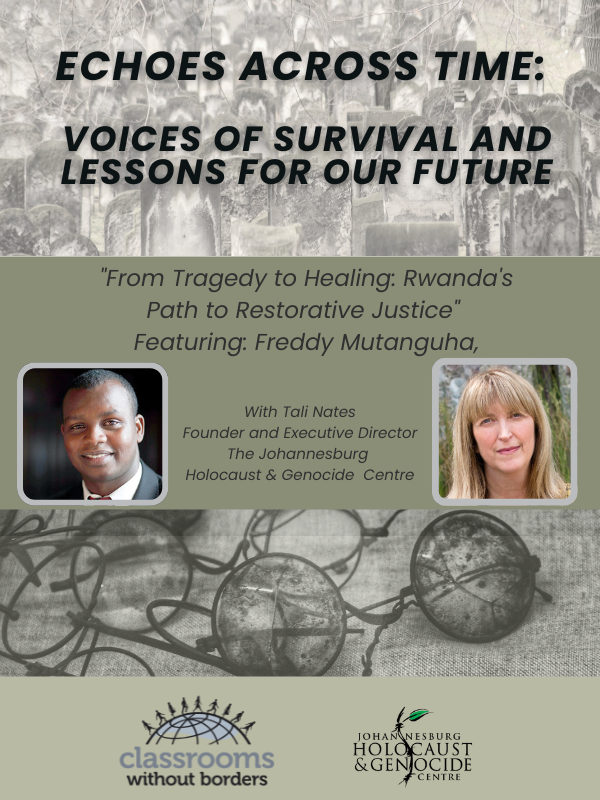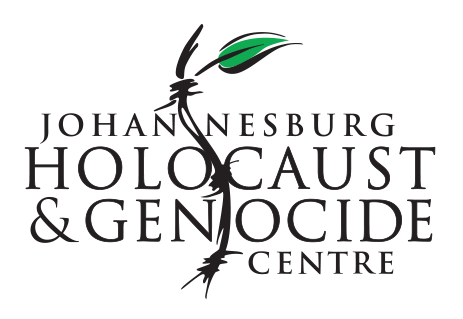29 October 2025 @ 9:00 pm – 10:00 pm

As we stand on the cusp of history, the voices of Holocaust and genocide survivors grow ever more urgent, reminding us of the cost of silence, the value of empathy, and the power of resilience. Echoes Across Time invites audiences to explore the crucial lessons these testimonies offer—on values, democracy, and the warning signs of oppression. Through monthly episodes, each centred around a survivor’s testimony about their life experiences, this series poses the question: Are we truly listening?
Join us as we amplify stories from the Holocaust to Rwanda, Cambodia, and beyond, engaging with survivors, scholars, and advocates who work tirelessly to preserve these legacies and inspire a more compassionate future.
From Tragedy to Healing: Rwanda’s Path to Restorative Justice
Featuring: Rwanda genocide survivor and Director of the Kigali Genocide Memorial and Aegis Trust, Freddy Mutanguha, shares his powerful story of survival, healing, and contributing to the country’s unique journey through restorative justice. This session will examine Rwanda’s approach to rebuilding—through forgiveness, communal healing, and reconciliation—and the powerful lessons this path holds for the world. Freddy’s testimony provides insight into how survivors and communities alike can transform trauma into hope, and how memory and accountability can drive long-lasting peace and understanding.
Freddy Mutanguha is CEO of the Aegis Trust and Director of the Kigali Genocide Memorial. Freddy led the development of Aegis’ peace education programme in Rwanda and is now leading Aegis’ work to take this model beyond the borders of Rwanda to areas at risk, including the Central African Republic, South Sudan and Kenya. Joining Aegis in 2004 during the construction of the Kigali Genocide Memorial as a team leader responsible for genocide documentation, he was appointed Country Director in 2006. Freddy is Chair of the board of Miracle Corner Rwanda, an organisation which aims to empower the community in Rwanda by helping young people to acquire the vocational skills they need to thrive socially and economically.
He holds a master’s degree in project management from the Maastricht School of Management and trained as a teacher, securing a bachelor’s degree in Education from the Kigali Institute of Education. He survived Rwanda’s 1994 genocide as a teenager, and as an orphan head of household, in 2016, the Justice and Security Foundation declared him a Peace award winner for his outstanding contribution to peace. He is also profiled in the Atlanta Human Rights Museum as a prominent activist for human rights.
Helping to found AERG, Rwanda’s student survivors association, Freddy went on to become vice-President of IBUKA, the national umbrella association for Rwandan genocide survivors. He is an External Advisory Committee member of the USC Shoah Foundation’s Visual History Archive in Los Angeles, and lectures internationally on the impact of the Genocide and the importance of forgiveness as way of post-conflict reconstruction.
Freddy Mutanguha will be in conversation with Tali Nates, the founder and director of the Johannesburg Holocaust & Genocide Centre (JHGC) and Chair of the South African Holocaust & Genocide Foundation (SAHGF). She is a historian who lectures internationally on Holocaust and genocide education, memory, reconciliation, and human rights. Born to a family of Holocaust survivors, her father and uncle were saved by Oskar Schindler. Tali has been involved in the creation and production of dozens of documentary films, published many articles and contributed chapters to different books among them God, Faith & Identity from the Ashes: Reflections of Children and Grandchildren of Holocaust Survivors (2015), Remembering The Holocaust in Educational Settings (2018), Conceptualising Mass Violence, Representations, Recollections, and Reinterpretations (2021) and The Routledge Handbook of Memory Activism (2023). South Africa by the Mail & Guardian newspaper and won many awards including the Kia Community Service Award (South Africa, 2015), the Gratias Agit Award (2020, Czech Republic), the Austrian Holocaust Memorial Award (2021), the Goethe Medal (2022, Germany), the US Secretary of State’s International Religious Freedom Award (2023), and the International Network of Genocide Scholar’s Impact Award (2024).

